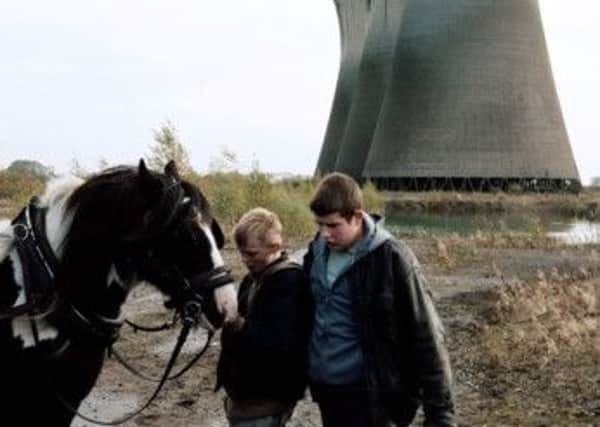Film review: The Selfish Giant


THE SELFISH GIANT (15)
Directed by Clio Barnard
Starring: Connor Chapman, Shaun Thomas, Sean Gilder, Lorraine Ashbourne
Rating: * * * *
It worked as both a necessary distancing device – without this, Dunbar’s story really would have been too painful to watch – and a clever way of making us question our own desire for authenticity in art: by drawing attention to the performance aspect, she was essentially exposing the fallacy that “social realism” is inherently more truthful and authentic than other forms of filmmaking.
Advertisement
Hide AdGiven this, it may seem surprising that her sophomore effort, The Selfish Giant, appears to adhere more closely to the social realist conventions she’d previously critiqued. Set on the same estate that featured in The Arbor, its story of two young outsiders on the already marginalised fringes of one of Bradford’s most economically deprived areas certainly gives rise to the kind of hard-hitting aesthetic and naturalistic performances one normally associates with Ken Loach. Watch the film closely, however, and what Barnard is really doing is tapping into what made Loach’s work, particularly Kes, so radical in the first place. Indeed, in creating a film about children and presenting the world from their subjective point of view, she’s embracing a tradition that is inherently cutting edge – whether it’s the pin-balling energy of The 400 Blows, the documentary-style immediacy of Kes, the visual poetry of Ratcatcher, the lyricism of This is England, the raw beauty of Fish Tank or the startling humanism of the Dardenne brothers’ collected output. Thus, while The Selfish Giant doesn’t announce its radical nature as forcefully as The Arbor did, that’s also partly because it doesn’t have to: its protagonists are such good company, Barnard is able to plunge us into the moment with them from the off without risking alienating audiences with their questionable behaviour.
First seen nicking copper wiring, Arbor and Swifty, brilliantly played by newcomers Connor Chapman and Shaun Thomas, may well be chancers, but they’re also fiercely and admirably loyal best friends who happen to have inadequate home lives, no role models and negligible prospects at school. That’s partly down to Arbor’s more hostile demeanor, a consequence of ADHD and other aggression-related problems for which he’s supposed to be on medication. The quieter Swifty, meanwhile, has an affinity for horses that makes him a bit of an outcast with the other kids, but also brings both boys into contact with a local scrap-dealer named Kitten (Sean Gilder). The latter has no qualms about exploiting the boys’ eagerness to earn money and, after they’re excluded from school for fighting, he encourages them to rent his horse and cart from him in order to collect scrap metal from sources that aren’t strictly legitimate.
Kitten also runs an illegal horse-and-cart racing operation – a sight to behold in the film – and his grooming of Swifty as a potential jockey drives a wedge between the lads as Arbor suddenly finds himself even more alone in the world than he was before.
Barnard is good at conveying this sense of isolation. Though the film at first seems rough-and-ready, particularly as cinematographer Mike Eley keeps the camera close to the boys in order to shrink the space between them and us, it gradually takes on a more poetic and more rigorously composed feel as the story progresses. This reflects both the way the boys begin to thrive as they attempt to take control of their destinies, yet it also allows Barnard to later show how the surrounding landscape seems to visually wither as the boys’ imaginative response to their lot in life runs up against the casual cruelty of the adult world.
The latter neatly relates back to the film’s title, a reference to the Oscar Wilde fairytale of the same name in which an ogre’s decision to stop children playing in its garden causes all its trees and flowers to die. Barnard uses the allegorical nature of the giant’s story as subtle comment on the damage society does to itself when it excludes children. Mercifully, she doesn’t bash us round the head with this, but there is palpable anger in the film, particularly as it builds towards heartache and tragedy. In the end, though, the generosity of spirit the film shows for the two boys at its heart makes The Selfish Giant a moving, absorbing and quietly radical film.
Alistair Harkness